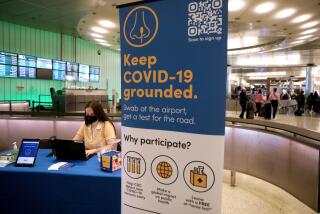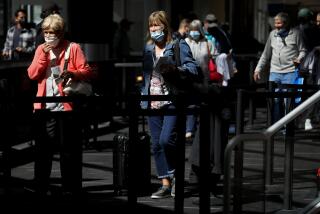Despite U.S. guidelines, flight attendants aren’t handing ill passengers face masks
- Share via
The fellow passenger with the hacking cough -- making no effort to cover his mouth -- is among an air traveler’s biggest gripes, right up there with the screaming baby and the toddler who won’t stop kicking the seat.
Amid concern about H1N1 and seasonal flu, federal health officials issued guidelines late last month on how to handle obviously sick passengers: Flight attendants should ask the person with the cough to wear a mask and move them at least 6 feet from others.
In the air, recent travelers report a different reality.
Heather Shaw was on a United Airlines flight earlier this month from San Francisco, where she lives, to Denver. The man sitting behind her had a “phlegmy cough,” one of a handful of passengers on the flight who were visibly ill.
“None of the attendants approached them, probably because so many people have colds right now that they figure it’s a lost cause,” Shaw said.
On Delta Connection flight 859, operated by Pinnacle Airlines, from Atlanta to Memphis late last week, a passenger hacked away and no flight attendants intervened. Aboard American Airlines flight 1586 from Los Angeles to Toronto on Friday, several people coughed throughout the five-hour trip. A flight attendant appeared confused when asked if masks were available and later reported that she had none.
Southwest Airlines flight attendants gave conflicting information, depending on the flight. When a passenger heading from Burbank to Phoenix on Southwest flight 1142 on Friday night asked for a face mask, a flight attendant’s response was, “No, sir, we have nothing like that.”
But on a flight from Los Angeles to Sacramento the next morning, a Southwest flight attendant said he had masks, but he had never handed any out.
Health officials have been warning the public to take care when traveling, as the number of flu cases rises during the holidays.
Airplanes in particular can be incubators for infectious disease. Large numbers of people in closed settings “can facilitate the transmission of influenza from person to person,” according to the guidelines released four days after Thanksgiving by the Centers for Disease Control and Prevention.
But knowing it’s a problem and getting people to act are separate matters.
Officials with half a dozen major airlines said that although they typically have masks available on flights, no policy requires flight attendants to offer them to ill passengers.
Tim Winship, editor at large for the website smartertravel.com, said it was rare for the seat next to a traveler to be empty, let alone to have 6 feet of space to spare between passengers.
“I can’t imagine how you would go about doing that with the cabins being as chockablock as they are with people,” Winship said.
Which leaves the use of masks to prevent the spread of germs. In Japan, it is common practice for people with cold and flu symptoms to wear masks to prevent the spread of illness.
But in the U.S., passengers rarely wear them.
Winship said that although he would be pleased if flight attendants offered masks to travelers with coughs, he understands why they don’t.
“I can see it turning adversarial. And for that reason, I can see where the flight attendants might be reluctant to broach the subject at all,” Winship said. “It’s the same reason why the flight attendants are reluctant to get in a back-and-forth about passengers carrying oversized bags.”
Some passengers, including Nick Roundtree, who owns a real estate brokerage firm in Seattle, would appreciate more intervention. Roundtree sat behind a sick woman on a Southwest Airlines flight to Denver on Dec. 6.
“She kept coughing and coughing and coughing. A deep nasty cough!” he said. “I absolutely think flight attendants should have masks available for passengers. I think they should have been proactive by handing the lady a mask.”
Times staff writers Nathan Olivarez-Giles, Andrea Chang, Richard Fausset, Mitchell Landsberg, Mike DiGiovanna, Steve Chawkins and Jay L. Clendenin contributed to this report.
More to Read
Sign up for The Wild
We’ll help you find the best places to hike, bike and run, as well as the perfect silent spots for meditation and yoga.
You may occasionally receive promotional content from the Los Angeles Times.







